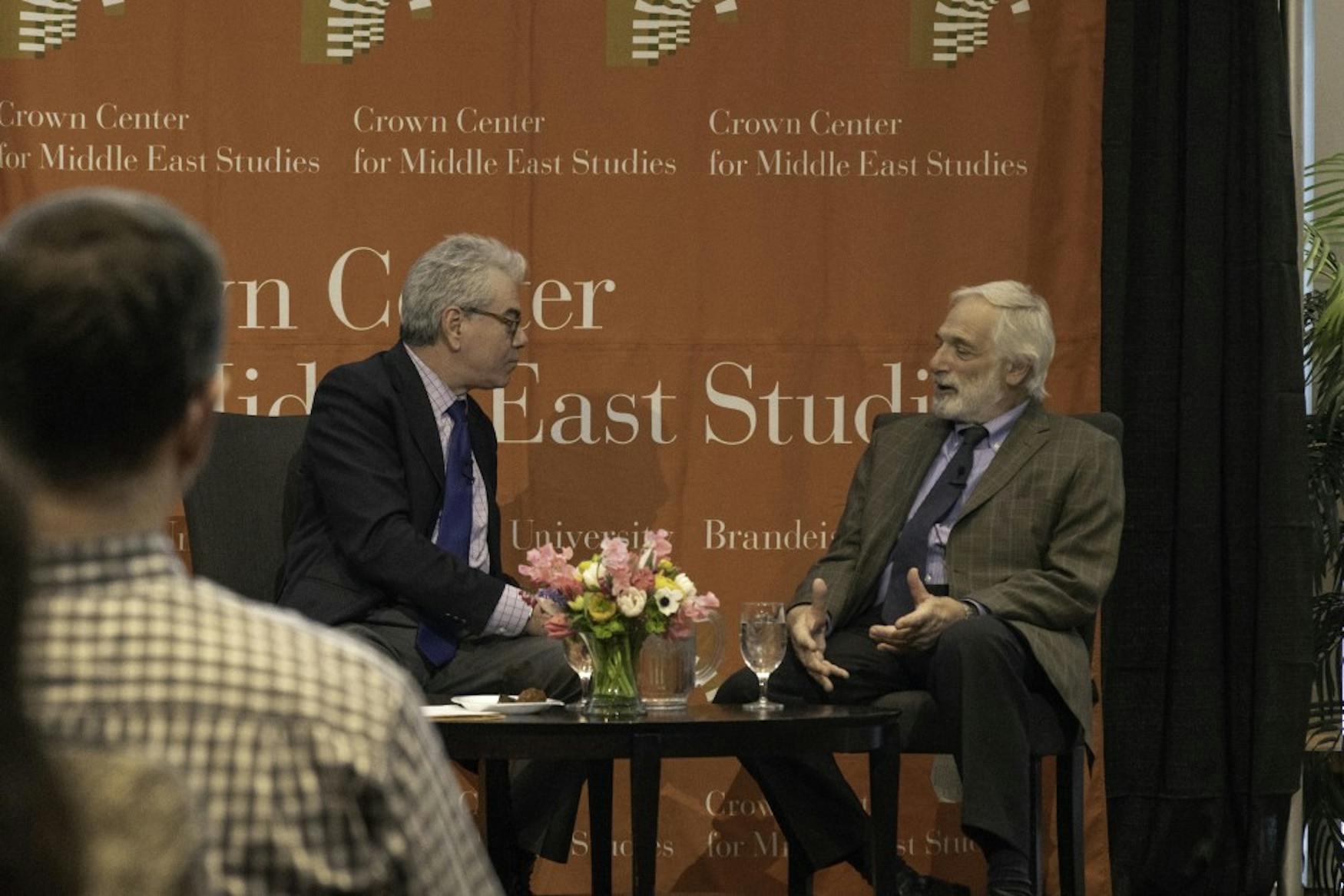Expert shares his experience in U.S.-North Korea negotiations
Brandeis alum Robert Gallucci also critiqued President Donald Trump’s approach to Iran negotiations.
Robert Gallucci M.A. ’68, Ph.D. ’74 came to Brandeis on Thursday and gave a Q&A-style talk entitled “Love and Fury: Trump Takes on North Korea and Iran.” The event was moderated by Senior Executive Director of the Crown Center Prof. Gary Samore (POL).
After getting both his master’s degree and doctorate from the Brandeis department of politics, Gallucci went on to become both an academic and a diplomat. He has served as dean of the Georgetown School of Service, president of the John D. and Catherine T. MacArthur Foundation and as a career civil servant at the U.S. Department of State and the United Nations, among other governmental and international agencies. His many accomplishments include monitoring the ceasefire in Sinai between Egypt and Israel, working as the senior coordinator for the nonproliferation and nuclear safety initiative in the former Soviet Union and serving as the chief U.S. negotiator in the North Korean nuclear crisis of 1994.
Gallucci explained that when he met with North Korean negotiators at the U.S. mission to the United Nations for the first time, he had no previous direct experience with the politics of the region. There were no successful negotiations with North Korea to look toward for guidance, he said. On the first day, he had no idea that the meeting would lead to a year and a half of negotiations. “I am not an expert on Korea or Asia,” he said. “I had been to South Korea once in my life before heading these negotiations. I know you’re horrified to find out your government works that way.”
While he had expected them to be unwilling to compromise, offering only a “political rant,” during the meeting, he was surprised to see that they were able to have a useful discussion. Gallucci said he felt that the meeting had gone well, and although other officials disagreed, he felt that what was important was that the nations were willing to engage in discussion with each other. He said the biggest lesson he learned from the entirety of the negotiations was that “these people had come to do business,” and that because of this, the two nations would be able to work together.
Gallucci said he remains optimistic that negotiations are still possible with the North Korean government despite U.S. President Donald Trump’s failure at the 2019 Hanoi Summit in February. He said he disagrees with the approach Trump has taken with the negotiations. Trump, he explained, is heavily critical of the negotiation skills of others, and, because of this, has decided to handle issues with North Korea at the presidential level – a move which Gallucci deemed “truly nutty.” The president and the chairman need to wait to come together until after a deal has been outlined, Gallucci said. “Both sides needed to be brought down the road to reach the intersection of the Venn diagram. … This guy [Trump] wants to leap to it,” he continued, explaining that the current administration has taken a “we don’t do anything until they do everything” approach to negotiations. “I’m not relaxed about where we are right now,” Gallucci said. “Things will likely get dicey by the time we get to our election season.”
With regards to Iran, Gallucci spoke about the dangers of Trump’s decision to pull the U.S. out of The Joint Comprehensive Plan of Action, a nuclear deal Iran and the P5+1 countries (China, France, Russia, the United Kingdom, United States and Germany) reached in 2015. “This may come back and bite us in the butt, to use a technical term,” he joked. There are very serious negative implications that arise when a president so enthusiastically undoes actions of their predecessor, Gallucci explained, saying that it is “somewhere between difficult and impossible to come back from that,” as it significantly diminishes U.S. negotiating currency.
While the JCPOA did not completely satisfy U.S. demands, it did what it had set out to do — prevent the development of a nuclear weapons program in Iran. “My own judgement was that [the JCPOA] was much preferable to going to war,” Gallucci said.
Responding to a question from an audience member about what the best course of action would be for the next president with regards to Iran, Gallucci said to “take the high road.” Honor the deal as a starting point, he suggested, while making it clear that the situation has not changed in the region.



Please note All comments are eligible for publication in The Justice.